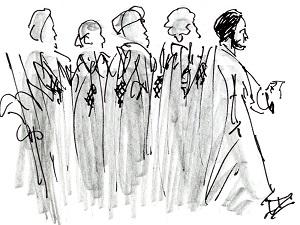
“The sabbath was made for man, not man for the sabbath” (Mark 2:28).
The teaching of Jesus was rarely new. Like all the prophets before him, he reminded his listeners to observe the commandments and fulfill the Covenant. He also asked people to examine their priorities. Put first things first. Do not let rules and rituals or human tradition take precedence over the spirit of the law or the necessities of love. In his encounters with some religious leaders, he affirmed that the Greatest Commandment of love of God and of neighbor always came first.
In what became an open conflict over Sabbath observance, especially whether it was lawful to heal the sick, in today’s gospel Jesus defends his disciples for clearing a path through a field and picking heads of grain. Mark suggests that Jesus’ opponents were watching him to find fault, and this action by his disciples constituted “work” on the Sabbath.
Jesus justified their behavior by citing the example of David, who took loaves of special bread from the temple to eat when he and his companions were hungry. Human need took priority over ritual obedience. The biblical context of the example added meaning to Jesus’ emphasis on priorities. When David and his companions ate the priestly bread, they were in flight from King Saul, who was trying to kill David out of jealousy (1 Sam 21:6). So, the question of eating holy bread was part of a more desperate scene, a matter of life and death. The higher command of survival took precedence.
In 2015, Pope Francis dismissed a question on the morality of condoms when asked about AIDS prevention in Africa, saying that other major crises in the plague-ridden continent had to be addressed first. The church as a field hospital for the wounded required that suffering and death be considered before moral analysis and judgment.
The late Bishop Kenneth Untener, who led the diocese of Saginaw, Michigan, asked that whatever action the church took should first be examined for its impact on the poor. By setting this organizing principle, he challenged both pastors and parishioners to keep the needs of the most vulnerable in mind when all projects and spending decisions were made.
Human need had to be a priority and, in a sense, “necessity knows no law” other than the law of compassion. It was the gospel, pure and simple, and applying it proved that if we change our priorities, we may end up changing our approach to every other issue.








